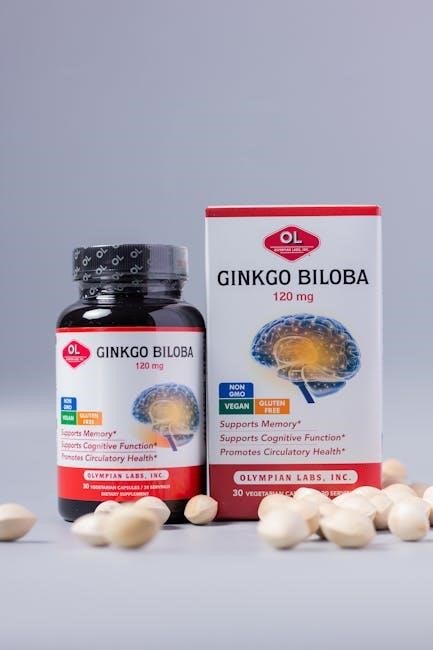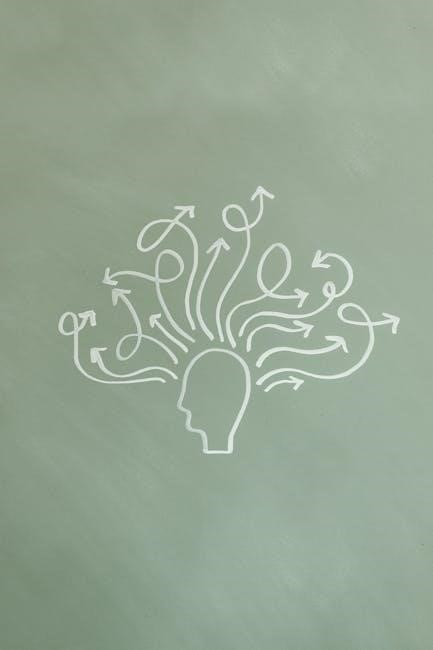Brain exercises are essential for enhancing memory and cognitive function. Neurobic exercises, cognitive stimulation, and physical activity improve brain health, preventing cognitive decline and boosting adaptability.
1.1 Understanding the Importance of Memory Enhancement
Memory enhancement is crucial for daily functioning, learning, and maintaining personal identity. Poor memory can lead to frustration and impact quality of life. Brain exercises and cognitive training are effective tools to strengthen memory, improving focus, recall, and overall brain function. Regular mental stimulation enhances neural connections, reducing cognitive decline and boosting adaptability, essential for lifelong learning and mental well-being.
1.2 Overview of Effective Brain Exercises
Effective brain exercises include neurobic activities, cognitive stimulation, and physical movement. Neurobic exercises engage the senses to enhance memory by forming new neural connections. Cognitive stimulation involves puzzles, problem-solving, and visual scanning, which improve focus and recall. Physical activity boosts brain function, reducing cognitive decline. Regular mental exercises like meditation and learning new skills further enhance memory and promote overall brain health, essential for maintaining cognitive function and adaptability throughout life.

Neurobic Exercises for Memory Enhancement
Neurobic exercises use novel sensory experiences to enhance memory by forming new neural connections, supporting brain health and improving cognitive function effectively.
2.1 What Are Neurobic Exercises?
Neurobic exercises are innovative brain workouts that engage the senses to enhance memory and cognitive function. Unlike traditional puzzles, they use sensory experiences to create new neural connections, promoting brain health and improving memory retention by stimulating the brain’s natural ability to form associations between different types of information.
2.2 Engaging the Five Senses in Memory Training
Engaging the five senses—sight, sound, touch, smell, and taste—activates multiple brain regions, enhancing memory retention. Neurobic exercises use sensory experiences to create vivid mental associations, strengthening neural connections. For example, linking information to specific smells or textures can make memories more vivid and easier to recall, leveraging the brain’s natural ability to process sensory inputs for better cognitive function and memory training.
2.3 Benefits of Neurobic Exercises for Brain Health
Neurobic exercises offer significant benefits for brain health by enhancing memory, boosting focus, and improving cognitive adaptability. They promote the growth of new neurons, reducing cognitive decline and sharpening mental clarity. Regular practice enhances sensory processing, strengthens neural connections, and supports long-term brain resilience, making them a valuable tool for maintaining robust brain health and improving overall quality of life.

Cognitive Stimulation Activities
Cognitive stimulation activities, including memory games, puzzles, and problem-solving exercises, enhance memory and focus by engaging the brain in challenging yet rewarding tasks.
3.1 Memory Games and Puzzles for Cognitive Training
Memory games and puzzles are effective tools for cognitive training. Activities like crosswords, Sudoku, and memory palaces challenge the brain, enhancing recall and mental agility. Regular engagement with these exercises strengthens neural connections, improving short-term memory and problem-solving skills. They also promote cognitive flexibility and adaptability, making them ideal for individuals seeking to enhance their memory capabilities effectively.
3.2 The Role of Problem Solving in Enhancing Memory
Problem-solving is a powerful cognitive exercise that enhances memory by engaging the brain in novel challenges. Activities like riddles, logic games, and puzzles strengthen neural pathways, improving memory retention and cognitive flexibility. These exercises stimulate critical thinking and adaptability, making the brain more efficient at processing and storing information. Regular problem-solving enhances focus, concentration, and mental agility, fostering a sharper and more responsive mind.
3.3 Visual Scanning and Numerical Processing Exercises
Visual scanning and numerical exercises enhance memory by training the brain to process information efficiently; Activities like spotting patterns, counting objects, and solving math problems improve attention, focus, and mental clarity. These exercises strengthen the connection between visual perception and cognitive functions, aiding in better information retention and recall. Regular practice boosts processing speed, memory accuracy, and overall cognitive performance.
The Impact of Physical Activity on Memory
Physical activity enhances brain function by improving blood flow and oxygen delivery, boosting memory retention. It reduces stress, promotes neuroplasticity, and strengthens neural connections, enhancing cognitive health.
4.1 How Exercise Improves Brain Function and Memory
Exercise enhances brain function by boosting blood flow and oxygen delivery, stimulating neuroplasticity. Physical activity reduces stress and anxiety, which impair memory, while promoting the growth of new neurons, particularly in the hippocampus, a key area for memory formation. Regular movement improves cognitive health by strengthening neural connections, enhancing learning and recall abilities, and supporting overall brain well-being.
4.2 Reducing Cognitive Decline Through Regular Movement
Regular physical activity significantly reduces the risk of cognitive decline by enhancing blood flow to the brain, promoting neuroplasticity, and strengthening neural connections. Exercise lowers inflammation and stress, key contributors to cognitive impairment. Studies show that consistent movement improves memory retention and slows dementia progression. By incorporating aerobic and strength training, individuals can protect brain health, enhancing overall mental well-being and maintaining cognitive function as they age;

Mental Exercises for Memory Improvement
Mental exercises like meditation, learning new skills, and engaging in crossword puzzles or video games enhance cognitive function and memory. These activities boost brain connectivity and improve focus, fostering a sharper mind and better recall abilities.
5.1 The Role of Meditation in Enhancing Cognitive Function
Meditation significantly enhances cognitive function by improving focus, memory, and mental clarity. Regular practice reduces stress and anxiety, which impair cognitive abilities. It promotes brain adaptability, fostering stronger neural connections. Studies show meditation supports attention and memory retention, essential for overall brain health. Incorporating meditation into daily routines can lead to lasting cognitive improvements, making it a powerful tool for memory enhancement.
5.2 Benefits of Learning New Skills for Brain Health
Learning new skills enhances brain health by promoting neuroplasticity, the brain’s ability to adapt and grow. It builds cognitive reserve, reducing the risk of cognitive decline. Engaging in new activities stimulates neural pathways, improving memory, problem-solving, and mental agility. This mental stimulation also delays cognitive aging, keeping the brain active and resilient. Acquiring new skills is a powerful way to strengthen brain function and improve overall cognitive performance.
5.3 The Effectiveness of Crossword Puzzles and Video Games
Crossword puzzles and video games are effective brain exercises that enhance memory and cognitive function. Crosswords improve vocabulary, memory recall, and mental agility, while video games boost problem-solving, attention, and spatial awareness. Both activities stimulate neural pathways, promoting brain adaptability and reducing cognitive decline. Engaging in these exercises regularly can significantly improve memory retention, processing speed, and overall brain health, making them valuable tools for cognitive enhancement.

Memory Techniques and Strategies
Memory techniques like association, visualization, and repetition enhance information retention. Organizing material into structured formats aids learning and recall, boosting cognitive function effectively.
6.1 The Power of Association in Memory Retention
Association strengthens memory by linking new information to existing knowledge or experiences. By connecting facts to emotions, visuals, or sensory details, the brain creates robust pathways, enhancing recall. This technique leverages the mind’s natural tendency to remember related concepts, making learning more efficient and retention more durable over time.
6.2 Using the Memory Palace Technique
The Memory Palace Technique, or Method of Loci, enhances memory by organizing information spatially. By visualizing a familiar place and linking items to specific spots, the brain retains data more effectively. This method is particularly useful for lists or sequential information, as it creates a mental map for easy recall. Regular practice strengthens memory and cognitive skills, making it a powerful tool for improving retention and retrieval abilities over time.
6.3 The Importance of Repetition in Learning
Repetition is a cornerstone of effective memory enhancement. By revisiting information multiple times, the brain strengthens neural pathways, making recall easier and more reliable. Consistent practice, spaced repetition, and varied review techniques solidify knowledge and prevent forgetting. This method is particularly effective in mastering complex concepts and ensuring long-term retention, making it a key strategy in memory improvement strategies and cognitive training programs.

The Role of Organization in Improving Memory
Organization enhances learning and memory by structuring information, making it easier to process and recall. Well-organized material improves retention and reduces cognitive overload, aiding mental clarity.
7.1 How Structured Information Enhances Learning
Structured information enhances learning by reducing cognitive overload and improving focus. Organized content, such as outlines or memory books, makes material easier to process and recall. By categorizing and linking information logically, it becomes more memorable. This method supports long-term retention and mental clarity, aiding individuals in retrieving details efficiently. Well-organized data minimizes confusion, ensuring that learning is more effective and sustainable over time.
7.2 The Use of Memory Books for Better Recall
Memory books serve as powerful tools for enhancing recall by storing and organizing key information. By documenting daily experiences, thoughts, and knowledge, individuals create a structured reference that aids retrieval. Regular use of memory books promotes independence and reinforces learning, making it easier to access stored information when needed. This method is particularly effective for those seeking to improve memory retention and cognitive clarity in a systematic manner.

Emotional and Mental Well-being
Emotional stability and mental well-being are crucial for memory. Managing stress and ensuring adequate sleep enhance memory consolidation, fostering a healthier brain and improved cognitive function;
8.1 Managing Stress to Improve Memory
Stress negatively impacts memory by reducing cognitive function and impairing neural connections. Engaging in relaxation techniques like meditation, yoga, or deep breathing can help mitigate stress, enhancing memory retention and recall. Chronic stress alters brain structure, affecting the hippocampus, which is vital for memory formation. By practicing stress management, individuals can create a conducive environment for brain health, fostering better memory consolidation and overall cognitive performance.
8.2 The Impact of Sleep on Memory Consolidation
Sleep plays a crucial role in memory consolidation, strengthening neural connections and transferring information from short-term to long-term memory. During sleep, the brain processes and refines memories, enhancing recall and cognitive function. Lack of sleep disrupts this process, impairing memory retention and learning abilities. Prioritizing quality sleep is essential for optimal memory performance and overall brain health, making it a vital component of memory improvement strategies.

Practical Tips for Daily Memory Training
Incorporate memory exercises into your daily routine, such as memory games, puzzles, and mindfulness practices. Consistency and variety are key to enhancing cognitive function and retention effectively.
9.1 Incorporating Memory Exercises into Your Routine
Start with simple daily memory exercises like puzzles, memory games, or Neurobic activities. Engage your senses by linking information to colors, textures, or smells. Use tools like memory books or apps to track progress. Consistency is key—dedicate 10-15 minutes daily to brain-stimulating tasks. Combine mental exercises with physical activity for enhanced benefits. Over time, these habits will improve focus, retention, and overall cognitive function, making memory improvement a sustainable part of your lifestyle.
9.2 Tracking Progress in Memory Improvement
Track your memory improvement by using memory books or journals to document daily achievements. Set specific goals and review progress regularly. Utilize digital apps or tools to monitor cognitive tasks and identify areas for improvement. Reflecting on advancements helps stay motivated and ensures consistent practice. Celebrate small victories to maintain enthusiasm and adjust routines as needed for optimal results.

The Role of Nutrition in Brain Health
Nutrition plays a vital role in brain health by providing essential nutrients for cognitive function. Foods rich in antioxidants, omega-3 fatty acids, and vitamins support memory enhancement and overall brain well-being. Proper hydration is equally important for maintaining focus and mental clarity, contributing to improved memory retention and cognitive performance.
10.1 Foods That Support Cognitive Function
Foods rich in antioxidants, omega-3 fatty acids, and vitamins are crucial for cognitive health. Fatty fish like salmon and mackerel, berries, nuts, and seeds support brain function. Leafy greens, whole grains, and dark chocolate also promote mental clarity. These nutrients enhance memory retention, reduce cognitive decline risk, and foster a healthy brain environment, making them essential for a memory-improvement diet. Proper nutrition is key to sustaining long-term brain well-being and optimal cognitive performance.
10.2 The Importance of Hydration for Memory
Hydration plays a vital role in brain function and memory. Even mild dehydration can impair focus, attention, and memory retention. Water makes up 80% of the brain, facilitating neural communication and nutrient delivery. Staying hydrated supports cognitive performance and prevents mental fatigue. Drinking 8-10 glasses of water daily is recommended to maintain optimal brain health and enhance memory capabilities effectively. Proper hydration is essential for sustaining mental clarity and overall cognitive well-being.

Neuroplasticity and Brain Adaptability
Neuroplasticity refers to the brain’s ability to adapt and reorganize itself, enhancing memory and cognitive function through new neural connections and strengthened pathways, crucial for lifelong learning and adaptability.
11.1 Understanding How the Brain Adapts and Grows
Neuroplasticity, the brain’s ability to adapt and grow, is vital for memory improvement. Through new neural connections, the brain reorganizes itself, enhancing cognitive function. Regular brain exercises, such as neurobic activities and cognitive stimulation, promote this adaptability. As neurons grow and connect, the brain’s capacity to process and retain information improves, making learning and memory more efficient over time with consistent practice and mental stimulation.
11.2 Exercises That Promote Neuroplasticity
Neurobic exercises, such as engaging multiple senses, and cognitive stimulation activities like problem-solving, enhance neuroplasticity. These exercises encourage the brain to form new neural connections, improving adaptability. Regular mental and physical activities, including aerobics, promote blood flow and neuron growth, fostering a resilient brain capable of reorganizing itself to enhance memory and learning abilities over time with consistent practice.
Consistent brain exercises improve memory and cognitive function, fostering neuroplasticity and brain health. Regular practice enhances mental sharpness, ensuring long-term benefits for overall well-being and adaptability.
12.1 Summarizing Effective Brain Exercises
Effective brain exercises, such as neurobic exercises, cognitive stimulation, and physical activity, enhance memory and cognitive function. These practices promote neuroplasticity, improve focus, and reduce cognitive decline. Incorporating mental exercises like meditation, puzzles, and learning new skills fosters brain adaptability. Consistency in these activities strengthens neural connections, ensuring long-term brain health and well-being.
12.2 Encouraging Consistency in Memory Training
Consistency is key to improving memory through brain exercises. Regular practice strengthens neural connections, enhancing cognitive function. Incorporate exercises into your daily routine, such as puzzles or meditation, to build a lasting habit. Tracking progress and celebrating small achievements can keep you motivated. Over time, consistent training improves focus, boosts memory retention, and reduces cognitive decline, leading to a sharper, healthier mind.